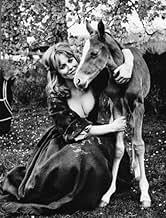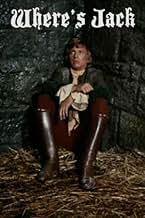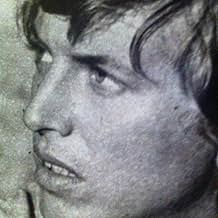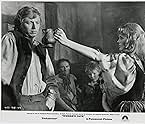Agrega una trama en tu idiomaThe adventures and the exploits of notorious English thief and prison-breaker Jack Sheppard in 1720s London.The adventures and the exploits of notorious English thief and prison-breaker Jack Sheppard in 1720s London.The adventures and the exploits of notorious English thief and prison-breaker Jack Sheppard in 1720s London.
- Dirección
- Guionistas
- Elenco
- Dirección
- Guionistas
- Todo el elenco y el equipo
- Producción, taquilla y más en IMDbPro
Opiniones destacadas
Note: I've tried not to give away any important plot twists (or the ending) but if you're concerned about that, please think about viewing the film before reading further--Thanks!
This was obviously a fairly high budget production, released by Paramount. The story follows the (supposedly true)exploits of hiway-man Jack Shepard in 1700's London. He was a locksmith who got blackmailed into a life of crime by the nefarious "Thief-Taker" to save his brother's life. After being double crossed by the Thief-Taker, we turns into a sort of Robin Hood type figure and gains the support of the common folk. He proceeds to make escapes from several prisons (including the infamous Newgate) as well as having time to "entertain" numerous noble ladies.
I really enjoyed the film, even though the plot was a bit predictable. The film was shot in Glencree and Wicklow Ireland and the sets were very well done and seemed realistic. I think Clavell captured the bustling atmosphere of London in the 1700's quite well and I enjoyed his creative use of camera angles. And, unlike many films depicting this period, Clavell pulls no punches in showing us the deplorable conditions in which the poor lived (in one scene several folks fight over a meat pie that has rolled through the filth in the street).
Overall, I really enjoyed this film. I will admit that it lacks the wonderful scenery and underlying political commentary that Clavell's next film The Last Valley has (a parable to the Vietnam War), but it still merits a viewing or two. It is regrettable that it has not ever (to my knowledge) been released on video or DVD.
This was obviously a fairly high budget production, released by Paramount. The story follows the (supposedly true)exploits of hiway-man Jack Shepard in 1700's London. He was a locksmith who got blackmailed into a life of crime by the nefarious "Thief-Taker" to save his brother's life. After being double crossed by the Thief-Taker, we turns into a sort of Robin Hood type figure and gains the support of the common folk. He proceeds to make escapes from several prisons (including the infamous Newgate) as well as having time to "entertain" numerous noble ladies.
I really enjoyed the film, even though the plot was a bit predictable. The film was shot in Glencree and Wicklow Ireland and the sets were very well done and seemed realistic. I think Clavell captured the bustling atmosphere of London in the 1700's quite well and I enjoyed his creative use of camera angles. And, unlike many films depicting this period, Clavell pulls no punches in showing us the deplorable conditions in which the poor lived (in one scene several folks fight over a meat pie that has rolled through the filth in the street).
Overall, I really enjoyed this film. I will admit that it lacks the wonderful scenery and underlying political commentary that Clavell's next film The Last Valley has (a parable to the Vietnam War), but it still merits a viewing or two. It is regrettable that it has not ever (to my knowledge) been released on video or DVD.
Even though I saw this film when I was very young, I already knew the story of Wild the Thief-Taker and Shepherd who famously escaped from Newgate prison.
Apart from the liberty taken right at the end, the film more or less faithfully follows the true story. The temptation to bend the facts which is the hallmark of so many so-called historical films is resisted in this film and the film makers must be praised for that.
Of the performances, There is scarcely a poor performance, and Tommy Steele is ideally cast. Also good is Stanley Baker as the Thief-Taker and Alan Badel is good as always.
Because the film sticks to the facts, it makes it suitable to be watched by all the family.
Apart from the liberty taken right at the end, the film more or less faithfully follows the true story. The temptation to bend the facts which is the hallmark of so many so-called historical films is resisted in this film and the film makers must be praised for that.
Of the performances, There is scarcely a poor performance, and Tommy Steele is ideally cast. Also good is Stanley Baker as the Thief-Taker and Alan Badel is good as always.
Because the film sticks to the facts, it makes it suitable to be watched by all the family.
Jonathan Wild was one of the most interesting characters in 18th century London. Long before the city had a police force, Wild turned himself into the capital's "thief-taker", arresting and bringing criminals to trial and making himself rich in the process. At the same time, he was also the greatest criminal mastermind in the country and had most of the city's major criminals under his control. When they became troublesome Wild would set them up for arrest, and then collect his bounty as thief taker.
In this film Wild is played, rather well, by Stanley Baker, who also produced through his production company Oakhurst, with the novelist James Clavell directing. The story focuses on Wild's relationship with another notorious 18th century criminal, Jack Shepherd, here played by the '60s singing star Tommy Steele. Shepherd is forced to work for Wild to save his brother from the hangman, but then manages to assert his independence and work for himself. Wild then sets him up, only for Shepherd to escape from one jail after another. Shepherd's exploits, especially his escapes, make him a celebrity, and Wild's attempts to capture him become increasingly important to the maintenance of his image as thief taker. Steele isn't ideal casting as Shepherd, but he does manage to acquit himself reasonably well, and his scenes with Stanley Baker are among the best in the film. Overall, the film is something of a mixed blessing, however. The story is a winner, there are some interesting character bits and, as was increasingly the fashion in the '60s, it shows the grot, grime and filth of 18th century London quite well. But it does go overboard at times with the local colour, the pace slackens a bit occasionally, and there are some decidedly cheesy 1960s songs on the soundtrack. However, it's an interesting story and is probably worth a couple of hours of your time, especially if you're interested in the period.
In this film Wild is played, rather well, by Stanley Baker, who also produced through his production company Oakhurst, with the novelist James Clavell directing. The story focuses on Wild's relationship with another notorious 18th century criminal, Jack Shepherd, here played by the '60s singing star Tommy Steele. Shepherd is forced to work for Wild to save his brother from the hangman, but then manages to assert his independence and work for himself. Wild then sets him up, only for Shepherd to escape from one jail after another. Shepherd's exploits, especially his escapes, make him a celebrity, and Wild's attempts to capture him become increasingly important to the maintenance of his image as thief taker. Steele isn't ideal casting as Shepherd, but he does manage to acquit himself reasonably well, and his scenes with Stanley Baker are among the best in the film. Overall, the film is something of a mixed blessing, however. The story is a winner, there are some interesting character bits and, as was increasingly the fashion in the '60s, it shows the grot, grime and filth of 18th century London quite well. But it does go overboard at times with the local colour, the pace slackens a bit occasionally, and there are some decidedly cheesy 1960s songs on the soundtrack. However, it's an interesting story and is probably worth a couple of hours of your time, especially if you're interested in the period.
This film is distinguished both in art direction and cinemaphotography.
Unfortunately the script is poorly structured and repetitive and overall the film fails to engage the viewer. Performances vary with, surprisingly, Tommy Steele finding a fairly confident middle ground between Stanley Baker's melodramatic approach and Fiona Lewis's ludicrous and unconvincing stab at Cockney. At a whisker under two hours long the film would have benefited from some cutting - Jack Shephard surrendering once to Jack Wild because he has captured Edgworth Bess seems possible, for him to do it again suggests the writers had seriously run out of ideas.
Unfortunately the script is poorly structured and repetitive and overall the film fails to engage the viewer. Performances vary with, surprisingly, Tommy Steele finding a fairly confident middle ground between Stanley Baker's melodramatic approach and Fiona Lewis's ludicrous and unconvincing stab at Cockney. At a whisker under two hours long the film would have benefited from some cutting - Jack Shephard surrendering once to Jack Wild because he has captured Edgworth Bess seems possible, for him to do it again suggests the writers had seriously run out of ideas.
I saw this movie in Germany while stationed there from 69-72. I found it to be very enjoyable and fun. I have been hoping it would come out on DVD so I could own it. It is a great movie to immerse yourself in a story of the period. It was romantic, adventurous and at times witty. If you are looking for a movie that will create a few hours of escape from your own reality then this is a movie for you. I especially found the ending to be delightful lending to the feeling of a potential sequel giving the character a new adventure in the Americas. As with most of Stanley Baker's movies I thought it was well done even thought it may have been a bit self serving, non-the-less a very enjoyable movie.
¿Sabías que…?
- TriviaYul Brynner's son, Rock Brynner, appears uncredited as a drunkard. The movie was filmed outside of Dublin, and the young Brynner was studying in Trinity College at the time. Whenever his dad would come to visit him, Dublin's press photographers would have a field day.
- ErroresKing George I was referred to only as King George during his lifetime. It was not until George II took the throne that his father was known as George I.
- Citas
The Captain: By divine right, Thief-taker. And the British army
Selecciones populares
Inicia sesión para calificar y agrega a la lista de videos para obtener recomendaciones personalizadas
- How long is Where's Jack??Con tecnología de Alexa
Detalles
Taquilla
- Presupuesto
- USD 3,000,000 (estimado)
- Tiempo de ejecución
- 2h(120 min)
- Mezcla de sonido
- Relación de aspecto
- 1.85 : 1
Contribuir a esta página
Sugiere una edición o agrega el contenido que falta




















